完整word版,原因状语从句语法讲解
- 格式:doc
- 大小:36.53 KB
- 文档页数:3
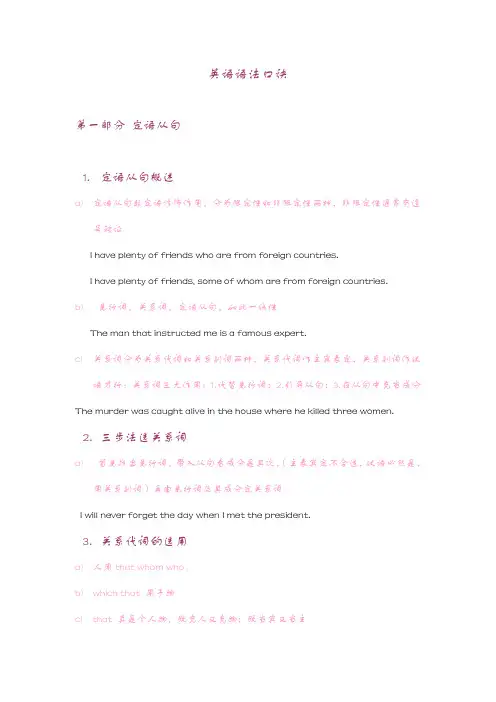
英语语法口诀第一部分定语从句1.定语从句概述a)定语从句起定语修饰作用,分为限定性和非限定性两种,非限定性通常有逗号验证I have plenty of friends who are from foreign countries.I have plenty of friends, some of whom are from foreign countries.b)先行词,关系词,定语从句,如此一线性The man that instructed me is a famous expert.c)关系词分为关系代词和关系副词两种,关系代词作主宾表定,关系副词作状语才行:关系词三大作用:1.代替先行词;2.引导从句;3.在从句中充当成分The murder was caught alive in the house where he killed three women.2.三步法选关系词a)首先找出先行词,带入从句看成分是其次,(主表宾定不合适,状语必然是,用关系副词)再由先行词及其成分定关系词I will never forget the day when I met the president.3.关系代词的选用a)人用that whom who。
b)which that 用于物c)that 真是个人物,既充人又充物;既当宾又当主d)whom 只做宾,which that who 既宾又主e)whose 作定语(=名词+of which),不分人或物The tall house whose windows face the south is my office.4.关系副词的选用a)先行词the time,需用关系副词时,用when 才可以若关系词在从句中充当状语,则关系词应用when,the time +when(=on which)I will never forget the days when I lived with you happily.I will never forget the days which I spent learning English .b)先行词the place,需用关系副词时,where来效力若关系词在从句中充当状语。
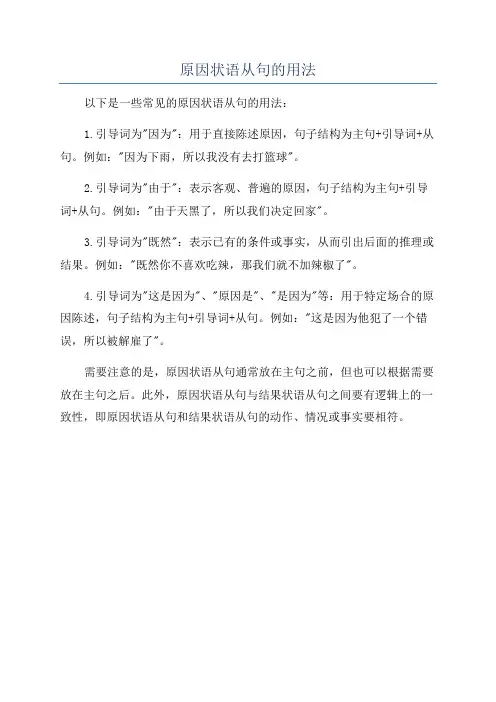
原因状语从句的用法
以下是一些常见的原因状语从句的用法:
1.引导词为"因为":用于直接陈述原因,句子结构为主句+引导词+从句。
例如:"因为下雨,所以我没有去打篮球"。
2.引导词为"由于":表示客观、普遍的原因,句子结构为主句+引导词+从句。
例如:"由于天黑了,所以我们决定回家"。
3.引导词为"既然":表示已有的条件或事实,从而引出后面的推理或结果。
例如:"既然你不喜欢吃辣,那我们就不加辣椒了"。
4.引导词为"这是因为"、"原因是"、"是因为"等:用于特定场合的原因陈述,句子结构为主句+引导词+从句。
例如:"这是因为他犯了一个错误,所以被解雇了"。
需要注意的是,原因状语从句通常放在主句之前,但也可以根据需要放在主句之后。
此外,原因状语从句与结果状语从句之间要有逻辑上的一致性,即原因状语从句和结果状语从句的动作、情况或事实要相符。
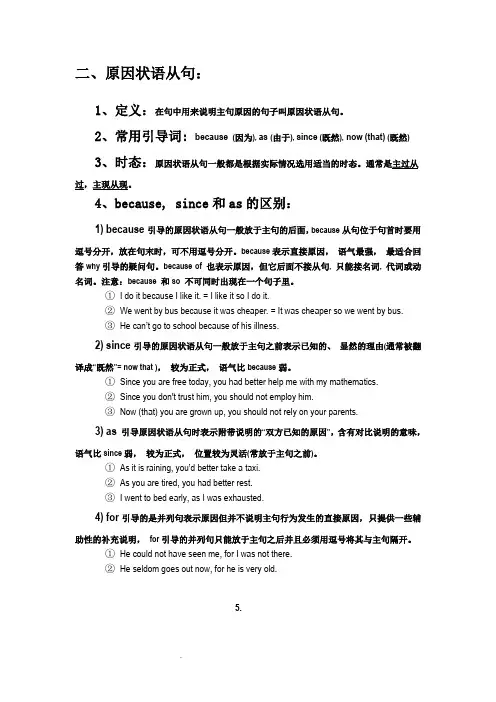
1、定义:在句中用来说明主句原因的句子叫原因状语从句。
2、常用引导词: because(因为), as (由于), since (既然), now (that) (既然)3、时态:原因状语从句一般都是根据实际情况选用适当的时态。
通常是主过从过,主现从现。
4、because, since和as的区别:1) because引导的原因状语从句一般放于主句的后面,because从句位于句首时要用逗号分开,放在句末时,可不用逗号分开。
because表示直接原因,语气最强,最适合回答why引导的疑问句。
because of 也表示原因,但它后面不接从句, 只能接名词, 代词或动名词。
注意:because 和so 不可同时出现在一个句子里。
①I do it because I like it. = I like it so I do it.②We went by bus because it was cheaper. = It was cheaper so we went by bus.③He can’t go to school because of his illness.2) since引导的原因状语从句一般放于主句之前表示已知的、显然的理由(通常被翻译成“既然”= now that ),较为正式,语气比because弱。
①Since you are free today, you had better help me with my mathematics.②Since you don't trust him, you should not employ him.③Now (that) you are grown up, you should not rely on your parents.3) as引导原因状语从句时表示附带说明的“双方已知的原因”,含有对比说明的意味,语气比since弱,较为正式,位置较为灵活(常放于主句之前)。
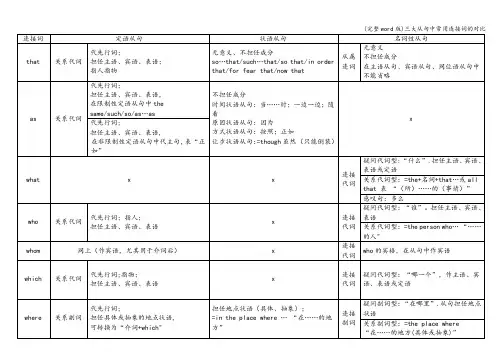
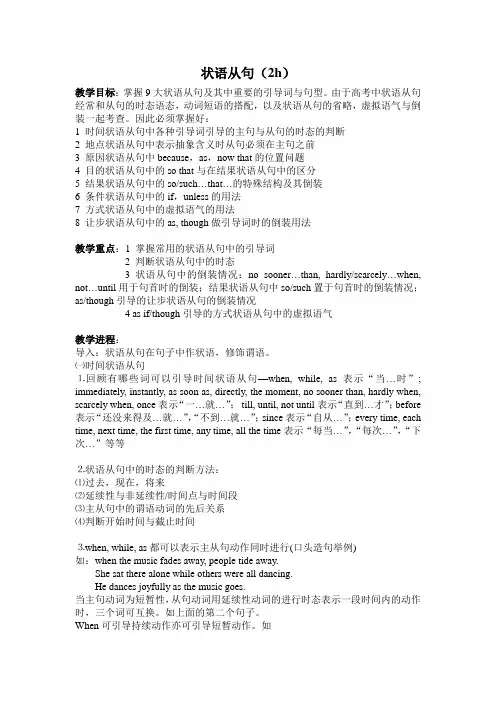
状语从句(2h)教学目标:掌握9大状语从句及其中重要的引导词与句型。
由于高考中状语从句经常和从句的时态语态,动词短语的搭配,以及状语从句的省略,虚拟语气与倒装一起考查。
因此必须掌握好:1 时间状语从句中各种引导词引导的主句与从句的时态的判断2 地点状语从句中表示抽象含义时从句必须在主句之前3 原因状语从句中because,as,now that的位置问题4 目的状语从句中的so that与在结果状语从句中的区分5 结果状语从句中的so/such…that…的特殊结构及其倒装6 条件状语从句中的if,unless的用法7 方式状语从句中的虚拟语气的用法8 让步状语从句中的as, though做引导词时的倒装用法教学重点:1 掌握常用的状语从句中的引导词2 判断状语从句中的时态3 状语从句中的倒装情况:no sooner…than, hardly/scarcely…when, not…until用于句首时的倒装;结果状语从句中so/such置于句首时的倒装情况;as/though引导的让步状语从句的倒装情况4 as if/though引导的方式状语从句中的虚拟语气教学进程:导入:状语从句在句子中作状语,修饰谓语。
㈠时间状语从句⒈回顾有哪些词可以引导时间状语从句—when, while, as表示“当…时”; immediately, instantly, as soon as, directly, the moment, no sooner than, hardly when, scarcely when, once表示“一…就…”;till, until, not until表示“直到…才”;before 表示“还没来得及…就…”,“不到…就…”;since表示“自从…”;every time, each time, next time, the first time, any time, all the time表示“每当…”,“每次…”,“下次…”等等⒉状语从句中的时态的判断方法:⑴过去,现在,将来⑵延续性与非延续性/时间点与时间段⑶主从句中的谓语动词的先后关系⑷判断开始时间与截止时间⒊when, while, as都可以表示主从句动作同时进行(口头造句举例)如:when the music fades away, people tide away.She sat there alone while others were all dancing.He dances joyfully as the music goes.当主句动词为短暂性,从句动词用延续性动词的进行时态表示一段时间内的动作时,三个词可互换。
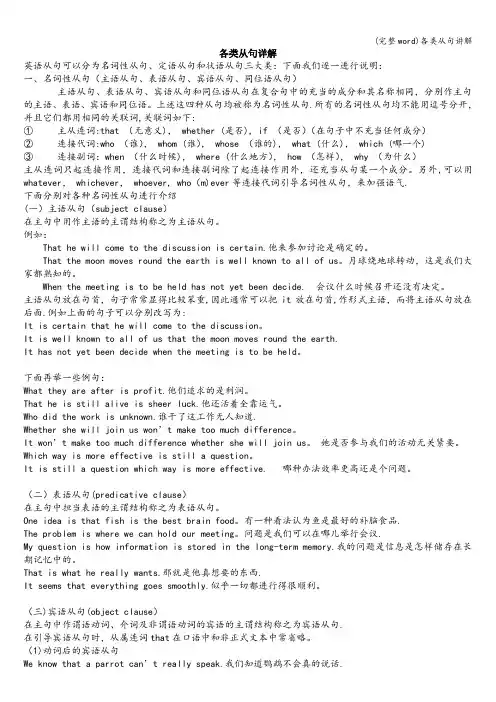
各类从句详解英语从句可以分为名词性从句、定语从句和状语从句三大类:下面我们逐一进行说明:一、名词性从句(主语从句、表语从句、宾语从句、同位语从句)主语从句、表语从句、宾语从句和同位语从句在复合句中的充当的成分和其名称相同,分别作主句的主语、表语、宾语和同位语。
上述这四种从句均被称为名词性从句.所有的名词性从句均不能用逗号分开,并且它们都用相同的关联词,关联词如下:①主从连词:that (无意义), whether (是否), if (是否)(在句子中不充当任何成分)②连接代词:who (谁), whom (谁), whose (谁的), what (什么), which (哪一个)③连接副词:when (什么时候), where (什么地方), how (怎样), why (为什么)主从连词只起连接作用,连接代词和连接副词除了起连接作用外,还充当从句某一个成分。
另外,可以用whatever, whichever, whoever, who(m)ever等连接代词引导名词性从句,来加强语气.下面分别对各种名词性从句进行介绍(一)主语从句(subject clause)在主句中用作主语的主谓结构称之为主语从句。
例如:That he will come to the discussion is certain.他来参加讨论是确定的。
That the moon moves round the earth is well known to all of us。
月球绕地球转动,这是我们大家都熟知的。
When the meeting is to be held has not yet been decide. 会议什么时候召开还没有决定。
主语从句放在句首,句子常常显得比较笨重,因此通常可以把it放在句首,作形式主语,而将主语从句放在后面.例如上面的句子可以分别改写为:It is certain that he will come to the discussion。
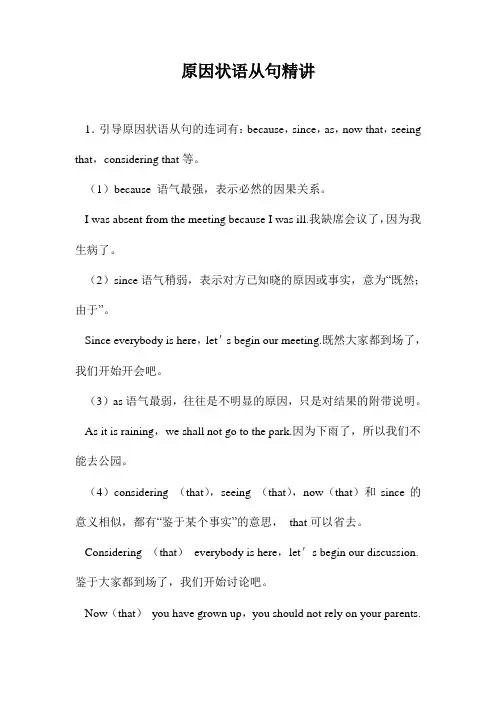
原因状语从句精讲1.引导原因状语从句的连词有:because,since,as,now that,seeing that,considering that等。
(1)because 语气最强,表示必然的因果关系。
I was absent from the meeting because I was ill.我缺席会议了,因为我生病了。
(2)since语气稍弱,表示对方已知晓的原因或事实,意为“既然;由于”。
Since everybody is here,let's begin our meeting.既然大家都到场了,我们开始开会吧。
(3)as语气最弱,往往是不明显的原因,只是对结果的附带说明。
As it is raining,we shall not go to the park.因为下雨了,所以我们不能去公园。
(4)considering (that),seeing (that),now(that)和since的意义相似,都有“鉴于某个事实”的意思,that可以省去。
Considering (that)everybody is here,let's begin our discussion.鉴于大家都到场了,我们开始讨论吧。
Now(that)you have grown up,you should not rely on your parents.鉴于你已经长大成人,你不应该依赖你父母了。
2.其他表示原因的方式除了状语从句外,一些介词短语同样可以表示原因,这样的短语有:because of,thanks to,due to,owing to等。
Because of the weather,we had to put off the sports meeting.由于天气原因,我们不得不推迟运动会。
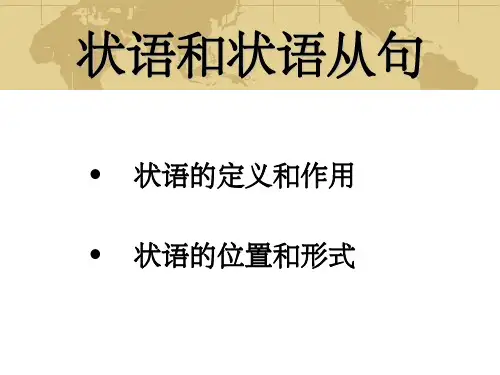
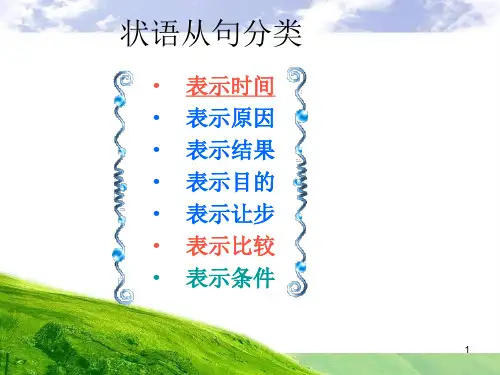
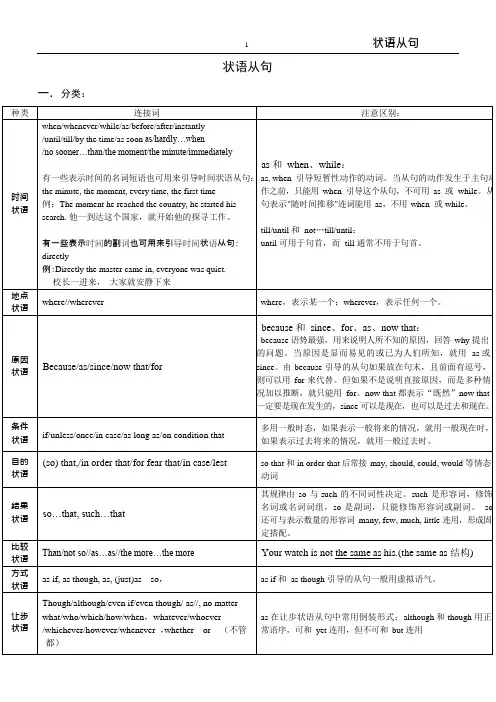
状语从句一.分类:when (当……的时候) while (在……期间) as (当……的时候, 一边……一边……) before (在……之前) since (自从……以来) till/until (直到) hardly…when… (刚……就) as soon as (一……就……) 就)after (在……之后) not…till/until (直到……才) no sooner…than…(刚……让步状语从句:比较状语从句: 更)where (在那里) wherever(无论哪里)because (因为) since (因为,既然) as (由于) for (为了) now that (既然)(so )that=in order that (以便) so as (not )to ( 以便[不]) in case (以免) lest (以免) so+adj./adv.+that (如此……以致) so that (结果……)such+n.+that (如果……以致) that (所以,因此)though/although 不可同 but 连用。
though/although (虽然) however (可是) even though/if (即使)no matter+what/which/where/who/when =whatever/whichever/wherever/whoever/whenever(不论什么/哪一个/哪里/谁/何时)as (正如) as…as (和……一样) not as/so … as (不如……) than (比……the+比较级…+the+比较级 (越……越……)if (假设) unless (如果不) so long as (只要) on condition that (如果) as (像……那样地) just as (正像) as if (好像) as though (好像)二.各种状语从句的简化方法:1. sth.作状语。
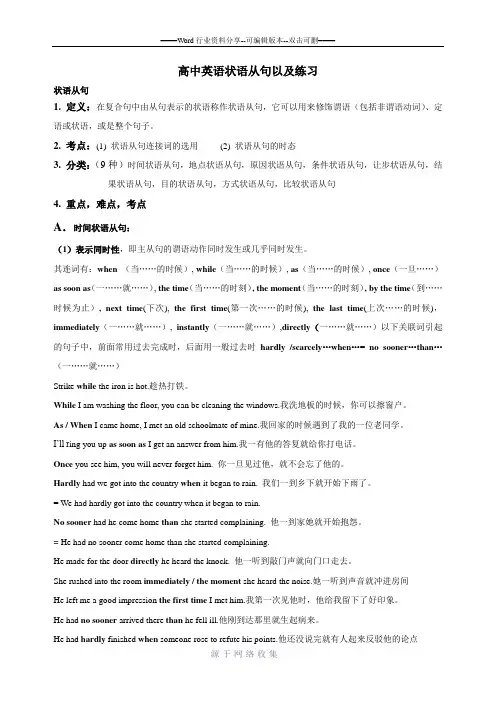
高中英语状语从句以及练习状语从句1. 定义:在复合句中由从句表示的状语称作状语从句,它可以用来修饰谓语(包括非谓语动词)、定语或状语,或是整个句子。
2. 考点:(1) 状语从句连接词的选用(2) 状语从句的时态3. 分类:(9种)时间状语从句,地点状语从句,原因状语从句,条件状语从句,让步状语从句,结果状语从句,目的状语从句,方式状语从句,比较状语从句4. 重点,难点,考点A.时间状语从句:(1)表示同时性,即主从句的谓语动作同时发生或几乎同时发生。
其连词有:when (当……的时候), while(当……的时候), as(当……的时候), once(一旦……)as soon as(一……就……), the time(当……的时刻), the moment(当……的时刻), by the time(到……时候为止), next time(下次),the first time(第一次……的时候),the last time(上次……的时候),immediately(一……就……),instantly(一……就……),directly(一……就……)以下关联词引起的句子中,前面常用过去完成时,后面用一般过去时hardly /scarcely…when…= no sooner…than…(一……就……)Strike while the iron is hot.趁热打铁。
While I am washing the floor, you can be cleaning the windows.我洗地板的时候,你可以擦窗户。
As / When I came home, I met an old schoolmate of mine.我回家的时候遇到了我的一位老同学。
I’ll r ing you up as soon as I get an answer from him.我一有他的答复就给你打电话。
Once you see him, you will never forget him. 你一旦见过他,就不会忘了他的。
状语从句的时间原因条件等用法详解状语从句的时间、原因、条件等用法详解状语从句是复合句中的一种从属从句,用来修饰并限定主句,提供时间、原因、条件等信息。
掌握状语从句的用法,能够让我们的表达更加准确、流畅。
本文将详细解析状语从句的时间、原因、条件等用法。
一、时间状语从句时间状语从句用来描述动作或事件发生的时间。
常见的时间状语从句引导词有:when(当...的时候)、while(当...的时候)、as(当...的时候)、before(在...之前)、after(在...之后)等。
例如:1. I will call you when I arrive home.(我到家时会给你打电话。
)2. He fell asleep as the movie started.(电影刚开始他就睡着了。
)3. Before I leave, I need to finish my work.(在我离开之前,我需要完成我的工作。
)二、原因状语从句原因状语从句用来解释主句中的原因。
常见的原因状语从句引导词有:because(因为)、since(既然)、as(由于)、for(因为)等。
例如:1. He couldn't attend the meeting because he was sick.(他因为生病无法参加会议。
)2. Since you are not feeling well, you should rest at home.(既然你感觉不舒服,你应该在家休息。
)3. I didn't take the job as it didn't meet my requirements.(我没有接受这份工作,因为它不符合我的要求。
)三、条件状语从句条件状语从句用来表达某种条件下发生的情况。
常见的条件状语从句引导词有:if(如果)、unless(除非)、provided that(倘若)、as long as(只要)等。
状语从句总结一、原因状语从句1原因状语从句通常由because; since; as; for引导..2because表示直接原因;语气最强..because引导的原因状语从句多放在主句之后..回答由why提出的问题;只能用because..此外;because和so不能同用在一个句子里..例如:------Why aren’t going there ------Because I don’t want to.since引导原因状语从句;相当于now that;意思是“因为……;既然……; 鉴于……”..例如:Since the rain has stopped;let’s go for a walk. 既然雨停了;我们出去散散步吧..as和since语气较弱;一般用来表示明显的原因..由as和since引导的原因状语从居多放在句首..例如:As he has no car; he can’t get there easily.Since we have no money; we can’t buy it.3for表示所说的理由是一种补充说明;for引导的从句一般不放在句子的开头..如:I decided to stop and have lunch; for I was feeling quite hungry.练习:I was late for class yesterday _______ there was something wrong with my bike.He took off his coat _______ he felt hot.you can’t answer the question; I’ll ask someone else.二、结果状语从句1结果状语从句由so…that; such…that; so that引导..2so…that语such...that可以互换..在由so...that引导的结果状语从句中;so是副词;与形容词连用..其结构是: “...so + 形容词副词+ that + 从句”..例如:He was so glad that he couldn’t say a word.Mother lives so far away that we hardly ever几乎不;从来不 see her.在由such…that引导的结果状语从句中;such是形容词;它修饰的可以是单数或复数可数名词;也可以是不可数名词;其结构是: “...such +a / an + 形容词+名词+ that + 从句”..例如:It was such a hot day that nobody wanted to do anything.He had such long arms that he could almost touch the ceiling.天花板有时上述两种结构是可以互换的..例如:It was such a wonderful film that all of us wanted to see it again.=The film was so wonderful that all of us wanted to see it again.3如果名词前由many; much; little; few等词修饰时;只能用so; 不用such..例如:Soon there were so many deer that they ate up all the wild roses.He has so little time that he can’t go to the cinema with you.4如果主从句的主语相同;并且从句是否定的形式;可以用too...to...句型转化..例如:He was so excited that he couldn't go to sleep that night. = He was too excited to go to sleep.5如果主从句的主语相同;但从句是肯定的形式;可以用adj.+ enough替换..例如:He is so old that he could go to school. = He is old enough to go to school.他够大了;可以去上学..练习:It is ___ hot in the room ___ we have to go out for a walk.It was a wonderful movie all of us wanted to see it again.There were little water in the bottle the bird couldn’t reach it..三、目的状语从句1目的状语从句通常由 so that; in order that为了;以便引导..例如:We started early so that we could catch the first train.We used the computer in order that we might save time.2so that可引导目的状语从句;此时可用to或in order to替换;将其改为简单句..例如:He got up early so that he could get to school on time.=He got up earlyin order to get to school on time.3so that既可引导目的状语从句;又可引导结果状语从句..区别这两种从句的办法有两个:1目的状语从句里往往带有情态动词can; could; may; might等..2从意思上看;目的状语从句往往表示的目的很明确..例如: Speak clearly so that they may understand you. 目的状语从句Jack is badly ill so that he has to rest. 结果状语从句练习: I hurried I wouldn't be late for class.We should go by bus ___ we can get there earlier.May I sit nearer I can see more clearly4 补充:so as to…肯定结构eg. He got up early so as to catch the early train.so as not to…否定结构eg.He got up early so as not to miss the early train.to…eg. He got up early to catch the early train.in order that …eg. He got up early in order that he could catch the early train.in order to…eg. He got up early in order to catch the early train.Translateso that 以便;为了他阅读更多书;以便他能知道更多知识..我们努力学习是为了我们能有一个好的未来我起得早是为了能赶上早一点的班车..请打开窗户以便我们能呼吸新鲜空气..你现在一定要走是为了不迟到..小男孩节省每一个硬币是为了他能在母亲节给他妈妈买一份礼物..她在网上购买了一部手机以便她能打电话..说得清楚些;使得他们能听懂你的意思.拿近一些;好让我看得更清楚些..我们现在就准备好;等父亲一来我们就可以走了..so...that... 如此太……以致……我太累了;以致我一吃完晚饭就去睡觉了..她太漂亮了以致很多人喜欢她..咖啡太热了以致于我现在不能喝..她如此年轻以致她不能照顾好她自己..男孩跑得太快了以致我不能追上他..他太饿了以致他不能说一个字..男人太强壮了以致他可以抬起这个重箱子..箱子太轻了以致他能背起它..他病得很厉害;今天无法上学..这个小孩以前经常撒谎;以至于现在没有人相信他..她很伤心以至于她伤心地哭了..那门太小了;以至于这只熊走不进去..他阅读更多书;以便他能知道更多知识.. He reads more books so that he can lean more knowledge.我们努力学习是为了我们能有一个好的未来 We study hard so that we can have a good future.我起得早是为了能赶上早一点的班车.. I got up early so that I could catch the early bus.请打开窗户以便我们能呼吸新鲜空气.. Please open the window so that we can breathe fresh air.你现在一定要走是为了不迟到.. You must go now so that you won't be late.小男孩节省每一个硬币是为了他能在母亲节给他妈妈买一份礼物..The little boy saved every coin so that he could buy his mother a present on Mother's day.她在网上购买了一部手机以便她能打电话.. I’ll give you all the facts so that you can judge for your self.说得清楚些;使得他们能听懂你的意思. Speak clearly; so that they may understand you.拿近一些;好让我看得更清楚些.. Bring it nearer so that I may see it better.我们现在就准备好;等父亲一来我们就可以走了.. Let's get ready now so that we can leave when Father comes.so...that... 如此太……以致……我太累了;以致我一吃完晚饭就去睡觉了.. I was so tired that I went to bed as soon as I had supper.她太漂亮了以致很多人喜欢她.. She is so beautiful that many people like her.咖啡太热了以致于我现在不能喝.. He coffee is so hot that I can't drink now.她如此年轻以致她不能照顾好她自己.. She is so young that she can't look after herself.男孩跑得太快了以致我不能追上他.. The boy ran so fast that I couldn't catch him.他太饿了以致他不能说一个字.. He was so angry that he couldn't say a word.男人太强壮了以致他可以抬起这个重箱子.. The man is so strong that he can lift the heavy box.箱子太轻了以致他能背起它.. The box is so light that he can carry it.他病得很厉害;今天无法上学.. He was so ill that he couldn't go to school today.这个小孩以前经常撒谎;以至于现在没有人相信他.. The child often told lies so that no one believes him now.她很伤心以至于她伤心地哭了.. She is so angry that she cried sadly.那门太小了;以至于这只熊走不进去.. The door is so small that the bear can’t go inside.强化练习一、单项选择..1.We’ll stay at home if it ______ tomorrow.A.rain B.rains C.is raining D.will rain2.We didn’t go home _____ we finished the work.A.since B.until C.because D.though3.She ______ when I went to see her.A.is reading B.have read C.was readingD.reads4._____ the rain stops; we’ll set off for the station.A.Before B.Unless C.As soon asD.Though5.She looks forward every spring to ____ the flower-lined garden.A.visit B.paying a visit C.walk inD.walking in6.Mr. White hoped he ______ China the next year.A.would visit B.will visit C.visitedD.has visited7.I told him that the sun ______ in the east.A.rises B.rose C.has risenD.was rising8.She was _____ tired _____ she could not move an inch.A.so; that B.such; that C.very; thatD.so; as9.He was sentenced to death _____ what he had stolen from the bank.A.that B.since C.because D.because of 10.I didn’t know what ______.A.was the matter B.is the matter C.the matter was D.the matter is11.I couldn’t agree with ______ at the meeting.A.that you said B.which you said C.what did you say D.what you said12.The bad man ran away to avoid _______ and was finally put into prison.A.seeing B.to be seen C.being seenD.to be caught13.Everyone except Jim and Jack ______.A.know who is he B.know who he is C.knows who is he D.knows who he is15.It is ten years ______ I left my hometown.A.since B.If C.whetherD.until16.Could you tell us ______ Mr. Brown lives in Room 202A.that B.where C.untilD.if17.I learned a little Russian _____ I was at middle school.A.though B.although C.as ifD.when18.I don’t know ______ or not it will rain tomorrow.A.that B.When C.ifD.whether19.—Why is their classroom so clean and tidy —______ it is cleaned every day.A.Since B.As C.Because D.For20.Can you tell me ______ is going to give us a talk next Monday A.who B.whom C.whose D.what21. Please answer the question in a loud enough voice ___ all the class may hear.A. so; thatB. orC. in order thatD.and22. Lift it up___I may see it.A. thoughB. so thatC. asD. than23. I hurried___I wouldn't be late for class.A. soB. so thatC. ifD. unless24. We should go by bus ___ we can get there earlier.A. as soon asB. whereC. in order thatD. as25. The dictionary is so expensive ___ I can't buy it.A. becauseB. whenC. thatD. if26. I got there ___ late ___ I didn't see him.A. too; toB. such; thatC. so; thatD. so; as27. It is ___ hot in the room ___ we have to go out for a walk.A. such; thatB. so; thatC. as; asD. such; as28. He has___ an interesting book that we want to read it.A. soB. suchC. the sameD. as29.Betty didn't go to see the film yesterday ___ she was ill.A. becauseB. butC. untilD. if30. He took off his coat _______ he felt hot.A. becauseB. asC. ifD. since31. The lady was fat that she was not fit for this skirt.A. tooB. asC. suchD. so32. Our PE teacher walks we can’t catch up with him.A. so quick thatB. too quickly thatC. so quickly thatD. too quickly that33. Mrs. Green is that she often gives candies to the children.A. so a nice ladyB. such a nice ladyC. a so nice ladyD. too nice a lady答案:1-5 BBCCD 6-10 AAADA 11-15 DCDBA 16-20 DDDCA21-25 C B B C C 25-30 C B B A A 31- D C B。
方式状语从句讲解方式状从句通常由as, (just) as⋯ so⋯, as if, as though引。
1. as , (just) as⋯ so⋯引的方式状从句通常位于主句后,但在(just) as⋯ so⋯构中位于句首,as 从句有比的含,意思是" 正如⋯ " , " 就像 " ,多用于正式文体,例如:Always do to the others as you would be done by.你希望人家怎待你,你就要怎待人。
As water is to fish, so air is to man.我离不开空气,犹如儿离不开水。
Just as we sweep our rooms, so we should sweep backward ideas from our minds.正如打房屋一,我也要除我中落后的西。
2. as if, as though两者的意和用法相同,引出的状从句多用虚气,表示与事相反,有也用述气,表示所情况是事或的可能性大。
常作" 仿佛⋯⋯似的" , " 好像⋯⋯似的 " ,例如:They completely ignore these facts as if (as though) they never existed.他完全忽略了些事,就仿佛它不存在似的。
(与事相反,用虚气。
)He looks as if (as though) he had been hit by lighting.他那子就像被雷了似的。
(与事相反,用虚气。
)It looks as if the weather may pick up very soon.看来天气很快就会好起来。
(的可能性大,用述气。
)明: as if / as though也可以引一个分短、不定式短或无短,例如:He stared at me as if seeing me for first time.他目不睛地看着我,就像第一次看我似的。
原因状语从句原因状语从句表原因,引导原因状语从句的从属连词主要的有because, as, since, for,seeing(that), now (that), considering (that),in that等。
以下逐一介绍常见的原因状语从句的引导词:because引导的原因状语从句一般放于主句之后,because表示直接原因,语气最强,最适合回答why引导的疑问句。
例如:I do it because I like it.我做这件事是因为我喜欢。
注意:“not ... because ”结构中的not否定的是because引导的整个从句,例如:The countryis not strong because it is large. 国强不在大。
since引导的原因状语从句一般放于主句之前表示已知的、显然的理由(通常被翻译成“既然”),较为正式,语气比because弱。
例如:Since you are free today, you had better help me with my mathematics.既然今天你休息,你最好帮我补习数学。
注意:seeing (that),now (that),considering (that) ,in that这几个词汇与since引导的原因状语从句意思相近,都表示“既然”。
例如:Seeing (that) he refused to help us, there ’s no reason that we should now help him. 他既然曾经拒绝帮助我们,我们现在没有理由要来帮助他。
Now (that) you are grown up, you should not rely on your parents.既然你长大了,就不应该依靠你的父母了。
Considering (that) everybody is here, let’s begin our discussion.既然大家都到了,我们就开始讨论吧。
副词从句一、什么是副词从句二、副词从句与对等从句的比较三、副词从句的种类1、时间2、地点3、条件4、原因5、结果6、目的7、让步8、比较9、方式一、时间状语从句常用引导词:when,as,while,as soon as,before,after,since,not....until特殊引导词:the minute,the moment,the second,every time,the day,the instant I didn't realize how special my mother was until I became an adult.直到我成为了一个成年人我才意识到我的母亲是多么的特殊。
While John was watching TV, his wife was cooking.当约翰看电视时,他的妻子正在做饭。
Every time I listen to your advice, I get into trouble.每当我听取你的建议时,我就会惹上麻烦。
二、地点状语从句常用引导词:where特殊引导词:wherever,anywhere,everywhereGenerally, air will be heavily polluted where there are factories.一般来说,有工厂的地方空气污染就严重。
Wherever you go, you should work hard.无论你去哪里,你都应该努力工作。
三、原因状语从句常用引导词:because,since,as,特殊引导词:seeing that,now that,in that,considering that,given that.My friends dislike me because I'm handsome and successful.我的朋友都不喜欢我,因为我又英俊又成功。
A、引导原因状语从句的连词 原因状语从句一般由从属连词because, as, since,now that引导。 B、because, as, since和now that的区别: 1、because“因为”,表示直接的原因,语气最强。 1)why提问的句子,必须用because回答。 2)because的从句常放在主句之后。 3)because 不能与so连用。 4)because+ 从句;because of+ 名词短语 I missed the train because I got up late. He was angry not because we were late but because we made a noise. -Why didn’t he come yesterday? -Because he was ill. 2、as“因为”,语气较弱,一般放在主句前,中间用逗号隔开,表示的是明显的原因。 As he was not well, I decided to go there without him. As it was raining hard, we had to be indoors. 3、since/ now that“既然”,一般放在主句前,中间用逗号隔开,表示的是明显的原因或众所周知的事实。 Since/ Now that this method doesn’t work, let]s try another. Since/ Now that you feel ill, you'd better not go to work. C、for 引导的并列句与原因状语从句的辨析 并列连词for“因为”,引导的不是从句,而是并列分句,只能放在主句之后,不能放在句首,常用逗号把它和前面的分句隔开。对主句补充说明理由或推断原因。 It rained last night, for the ground is wet. She must have gone out early, for she had not come for breakfast.
Exercise: 一、填入恰当的连词 1. I didn’t go to school yesterday _________ I was ill. 2. ________ everybody is here, let’s begin our meeting. 3. ________ you are in poor health, you should not stay up late. 4. I asked her to stay to tea, ________ I had something to tell her. 5. ________ all the passengers are here, why don’t we start at once? 6. Bill won’t make any progress ________ he doesn’t study harder than before. 7. He might have gone to bed, ________ the light went out. 二、 改写句子,保持句意不变 1) The ship changed its course because there was a storm. The ship changed its course _______ _______ _______ _______. 2) Because he was ill, he didn’t go to school. He was ill, _______ he didn’t go to school. 3) He couldn't walk because his leg was broken. He couldn't walk ______ ______ his ______ leg. 4) I came back because it was raining heavily. I came back ______ ______ the ______ rain. 三、课堂小结: _______________________________________________________________________________ _______________________________________________________________________________ _______________________________________________________________________________ _______________________________________________________________________________
四、回家作业: 一、填入恰当的连词 1. ______ you do not understand, I will explain again. 2. ______ Jane was the oldest in this family, she had to look after the others. 3. He must be ill, ______ he is absent today. 4. The teacher must be strict with you ______they want you to make great progress. 5. _____your father is well again, you no longer have anything to worry about. 6. The day breaks, _____the birds are singing. 7. ______ you are ill, you’d better go to see the doctor. 8. ______ she was late for class, she had to say sorry. 二、 选择恰当的答案 1. The man can’t get on the bus ______ there is no room on it. A. though B. because C. until D so that 2. ______ her daughter hadn’t come back, ______ she looked worried. A. Because, / B. Because, so C. Though, but D. Though, / 3._______ you’ve got a chance, you might make full use of it. A. Now that B. After C. Although D. As soon as 4. He found it difficult to read, _______ his eyesight was beginning to fail. A. and B. for C. but D. or 5. A man cannot smile like a child, ________ a child smiles with his eyes, while a man smiles with his lips alone. A. so B. but C. and D. for
五、学生反馈:(在完成回家作业的过程中存在的问题) _______________________________________________________________________________ _______________________________________________________________________________ _______________________________________________________________________________ _______________________________________________________________________________
六、教师反馈:(在批改学生回家作业中发现的问题) _______________________________________________________________________________ _______________________________________________________________________________ _______________________________________________________________________________ _______________________________________________________________________________
Keys: A、引导原因状语从句的连词:because, as, since,now that B、because, as, since和now that的区别: 1、because:“因为”,表示直接的原因,语气最强。 1)why提问的句子,必须用because回答。 2)because的从句常放在主句之后。 3)because 不能与so连用。 4)because+ 从句;because of+ 名词短语 2、as:“因为”,语气较弱,一般放在主句前,中间用逗号隔开,表示的是明显的原因。 3、since/now that:“既然”,一般放在主句前,中间用逗号隔开,表示的是明显的原因或众所周知的事实。 C、for 引导的并列句与原因状语从句的辨析:并列连词for“因为”,引导的不是从句,而是并列分句,只能放在主句之后,不能放在句首,常用逗号把它和前面的分句隔开。对主句补充说明理由或推断原因。 课堂练习:一、1.because 2.Since 3.As 4.because 5.Since 6.because 7.for 二、1.because of the storm 2. so 3. because of broken 4. because of heavy 回家作业:一、1.since 2. As 3. for 4. because 5. Since 6. for 7. Since 8. As 二、1.B 2.A 3.A 4.B 5.D